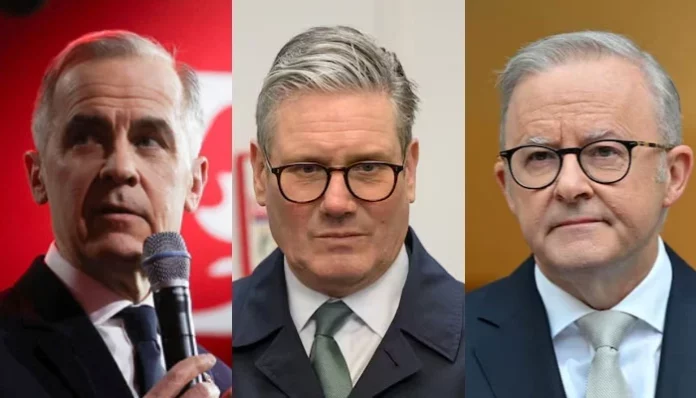DM Monitoring
Britain, Canada, and Australia all recognised a Palestinian state on Sunday in a move borne out of frustration over the Gaza war and intended to promote a two-state solution but which is also bound to anger Israel and its main ally, the United States.
The three nations’ decision aligned them with about 140 other countries which also back the Palestinians’ aspiration to forge an independent homeland from the Israeli-occupied territories.
“Today, to revive the hope of peace for the Palestinians and Israelis, and a two-state solution, the United Kingdom formally recognises the State of Palestine,” said PM Starmer.
Canada and Australia also recognised a Palestinian state today and other countries are expected to do so this week at the United Nations General Assembly in New York.
In a statement, Canadian Prime Minister Mark Carney announced that his country now recognises the state of Palestine.
“Canada recognises the State of Palestine and offers our partnership in building the promise of a peaceful future for both the State of Palestine and the State of Israel,” said Carney.
Similarly, Australian Prime Minister Anthony Albanese said his country was recognising Palestine as part of an effort to revive momentum for a two-state solution that starts with a ceasefire in Gaza and the release of hostages held there.
In a move that put Starmer at odds with US President Donald Trump, Britain had issued Israel with an ultimatum in July saying it would recognise a Palestinian state unless Israel took steps to end the “appalling situation” in Gaza.
Husam Zomlot, head of the Palestinian Mission in London, called the decision a “long-overdue recognition” that “is not about Palestine, but about Britain’s fulfilment of a solemn responsibility”.
“It marks an irreversible step towards justice, peace, and the correction of historic wrongs,” he added in a statement.
Starmer had said in July that Britain would recognise a Palestinian state unless Israel reached a ceasefire with Hamas, let more aid into Gaza, made clear there would be no annexation of the West Bank, and committed to a peace process delivering a two-state solution.
“Since that announcement in July, in fact, with the attack on Qatar, a ceasefire at this point lays in tatters, and the prospects are bleak,” Lammy said, noting Israel had also moved forward with a settlement plan.
Starmer has been under pressure from many of his own lawmakers, angry at the rising death toll in Gaza and images of starving children.
Britin’s historic involvement
Israeli Prime Minister Benjamin Netanyahu said this month there will never be a Palestinian state.
Londoners voiced mixed reactions.
“A whole lot needs to happen and peace needs to come to that region,” said 56-year-old charity director Michael Angus. “This is the first step in actually acknowledging that those people have a right to have somewhere to call home.”
Retiree Stephen, who declined to give his last name, said the government “probably means well” but argued the move was misguided: “They are sort of abandoning Israel… and with Hamas, (they) are almost sort of supporting them.”
Lammy previously said Britain has a historic responsibility to facilitate a two-state solution, dating back to the 1917 Balfour Declaration, which pledged that the creation of a Jewish state would not infringe on Arab rights.
“While a welcome step, Britain owes Palestine far more than recognition,” said Victor Kattan, public international law professor and adviser to the “Britain Owes Palestine” campaign, arguing for an apology and reparations for engineering violent divisions.
The decision may mean the Palestinian Mission in London is upgraded to embassy status. It could also result in banning products that come from Israeli settlements in the occupied Palestinian territories.
‘Recognition brings independence closer’
Palestinian Foreign Minister Varsen Aghabekian Shahin said countries recognising a Palestinian state this week were taking an irreversible step that preserved the two-state solution and brought Palestinian independence and sovereignty closer.
“Now is the time. Tomorrow is a historic date we need to build on. It’s not the end,” Shahin told reporters in Ramallah.
“It is a move bringing us closer to sovereignty and independence. It might not end the war tomorrow, but it’s a move forward, which we need to build on and amplify,” she said, referring to Israel’s nearly two-year military campaign in Gaza.



